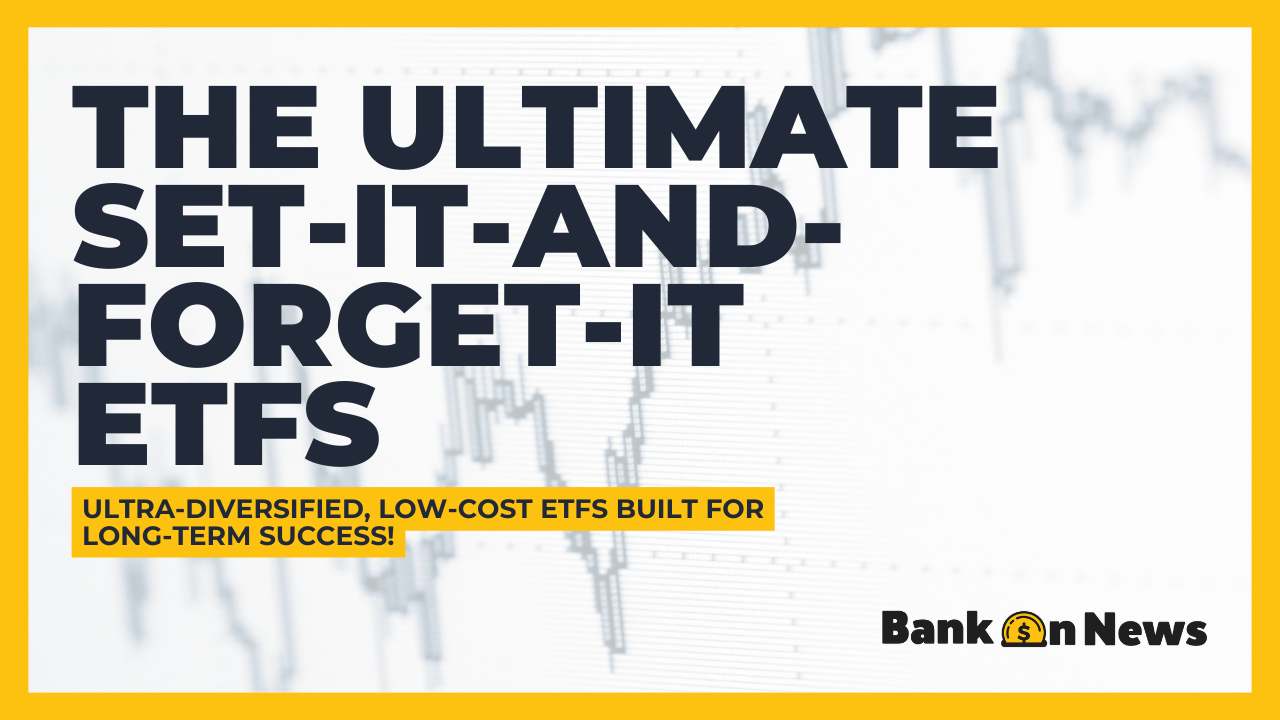⏰ The Ultimate Set-It-and-Forget-It ETFs: How to Own 2,400+ Stocks

In the ever-evolving world of investing, diversification remains a cornerstone strategy for mitigating risk and enhancing potential returns. For intermediate investors seeking a cost-effective and efficient way to achieve broad market exposure, exchange-traded funds (ETFs) offer a compelling solution. Today, we spotlight two standout ETFs that not only boast extensive portfolios of over 2,400 holdings each but also come with minimal fees, making them ideal candidates for a long-term, buy-and-hold strategy.
1. Schwab U.S. Broad Market ETF (SCHB)
Comprehensive Exposure to the U.S. Equity Market
The Schwab U.S. Broad Market ETF is designed to track the Dow Jones U.S. Broad Stock Market Index, providing investors with access to a vast array of U.S. companies across various sectors and market capitalizations. With an impressive portfolio exceeding 2,400 stocks, SCHB offers a microcosm of the entire U.S. equity landscape.
Key Features:
- Expense Ratio: One of SCHB's most attractive attributes is its ultra-low expense ratio of just 0.03%. This means that for every $10,000 invested, only $3 per year is allocated to management fees, allowing more of your money to work for you.
- Diverse Holdings: The fund's extensive holdings encompass a wide range of industries, from technology and healthcare to consumer goods and financials. This diversity helps mitigate the impact of sector-specific volatility on your overall portfolio.
- Market Capitalization Spectrum: SCHB includes companies of all sizes, offering exposure to large-cap stalwarts, mid-cap growth stories, and small-cap innovators. This blend provides a balanced approach to capturing the performance of established leaders and emerging players.
Why Consider SCHB?
For investors aiming for a low-cost, diversified entry into the U.S. stock market, SCHB presents a compelling option. Its broad-based approach ensures that your investment is spread across a wide array of companies, reducing the risk associated with individual stock selection.
2. Vanguard Total Stock Market ETF (VTI)
Embracing the Entire U.S. Stock Market
The Vanguard Total Stock Market ETF seeks to replicate the performance of the CRSP US Total Market Index, offering investors exposure to the entire U.S. equity market. With a portfolio that includes over 4,000 stocks, VTI provides one of the most comprehensive investment vehicles available.
Key Features:
- Expense Ratio: VTI boasts a minimal expense ratio of 0.03%, ensuring that the cost of investment remains exceptionally low, thereby maximizing potential returns over the long term.
- Extensive Diversification: The fund's holdings span the full spectrum of the U.S. equity market, including large-, mid-, small-, and micro-cap stocks. This extensive diversification helps smooth out performance fluctuations and reduces reliance on any single market segment.
- Sector Representation: VTI's portfolio is well-balanced across various sectors, providing exposure to technology, healthcare, financials, consumer services, and more. This sectoral balance enhances the fund's resilience against industry-specific downturns.
Why Consider VTI?
For those seeking an all-encompassing, low-cost investment in the U.S. stock market, VTI stands out as a premier choice. Its broad diversification and minimal fees make it an attractive option for building a solid foundation in a long-term investment strategy.
The Case for Long-Term Investment
Both SCHB and VTI are designed for investors with a long-term horizon. By holding these ETFs over extended periods, you can capitalize on the growth potential of the U.S. economy while benefiting from the power of compounding returns.
Advantages of These ETFs:
- Cost Efficiency: With expense ratios at a mere 0.03%, both funds ensure that the majority of your investment remains allocated to the underlying assets, rather than being eroded by high management fees.
- Broad Market Exposure: The extensive number of holdings in each ETF provides a level of diversification that would be challenging to achieve through individual stock selection, thereby reducing portfolio risk.
- Liquidity: As ETFs traded on major exchanges, both SCHB and VTI offer high liquidity, allowing for easy buying and selling without significant price distortion.
Considerations Before Investing
While SCHB and VTI offer numerous benefits, it's essential to align any investment with your individual financial goals, risk tolerance, and investment timeline. Here are a few factors to consider:
- Market Risk: As with all equity investments, these ETFs are subject to market fluctuations. It's crucial to be prepared for short-term volatility in pursuit of long-term gains.
- Investment Horizon: These funds are best suited for investors with a long-term perspective, as the benefits of diversification and compounding returns become more pronounced over time.
- Portfolio Balance: Ensure that your overall investment portfolio aligns with your risk tolerance and financial objectives. While these ETFs provide broad market exposure, it's important to consider how they fit within your broader asset allocation strategy.
Final Thoughts
Incorporating low-cost, broadly diversified ETFs like SCHB and VTI into your investment portfolio can be a prudent strategy for achieving long-term financial goals. Their extensive holdings and minimal fees offer a compelling combination for investors seeking to harness the growth potential of the U.S. equity market while maintaining a disciplined, cost-effective approach.
By embracing these ETFs, you position yourself to benefit from the collective performance of thousands of companies, thereby reducing the impact of individual stock volatility and enhancing your potential for sustained investment success.
Disclaimer: The information provided is for informational and educational purposes only and should not be considered financial, investment, legal, or tax advice. It does not constitute a recommendation or endorsement of any securities or financial instruments.
Investing involves risks, including potential loss of capital. Readers should conduct their own due diligence and consult a qualified advisor before making investment decisions. No representations are made regarding the accuracy or reliability of this content.
Subscribe to our newsletter.
Be the first to know - subscribe today

